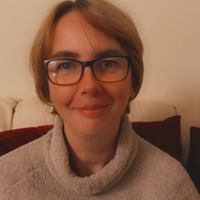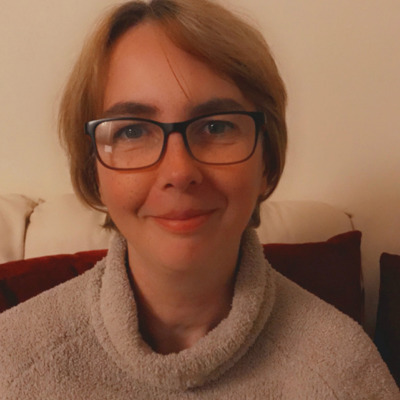
Ruth Laird
Software Engineer at Anaplan
I love learning new things and using that knowledge to solve problems, which I think is why I love working in computing.
About Ruth...
Who am I?
"I'm an explorer who likes to understand why things happen, enjoys finding information and using that to solve problems and puzzles. I think this fits really well in my role as a software engineer as we're given a problem that our customers want us to solve for them and we then have to find a way to solve it by writing code.This means I get to investigate different ways of doing things and understand how things fit togther to come up with the best solution.I'm also an investigator who likes to work things out logically, understand different information and work well with others to collect ideas. This fits well in my job because I work as part of a team discussing the problem we're trying to solve and sharing ideas on solutions. The technology is always changing and so there's always plenty of new things to learn and to try out.I'm also a campaigner who likes to help people work together, is organised and persuasive. As a team we split our solution up into smaller tasks that we then proritise, so being organised is very useful. Here we discuss our ideas, where I use my persuasive skills when putting my ideas forward but also help others put their ideas forward too."
What do I do?
"I work with a team of other software engineers to write computer code for a piece of software that is used by other companies to help them with their planning. It might be financial planning or it might be planning how many people they need and where they need them or it might be planning how much stock they need to order and from who and when they need it by. In our team we have a product owner who works closely with the customers to understand any areas of the software that are missing or not working well for them at the moment. We also have a User Experience designer who designs how the software should look and how the customer should use it. The software engineers then write the computer code, or connect other bits of code to make the software do what the customer needs and look how the User Experience designer wants it to look. A typical starting salary for a beginner engineer is around £25-30k but as you become more experienced this could increase to £50k+."
How did I get here?
"I didn't know what I wanted to do when I was at school so I chose A-Levels in subjects I was interested in - Maths, French and Economics. After my A-Levels I still wanted to keep my options open but had grown an interest in computing so I went to university and studied IT, Business Management and Languages. At the end of my degree I joined a company's graduate training scheme for 2 years. Here I worked on 4 different projects that gave me experience working in different areas of computing. In my last project I was working in a technical support role and started getting an interest in testing computer software as I seemed to be quite good at finding bugs and breaking things. I decided to make this my career and spent about 20 years working as a software tester in various roles at various companies including my current company, Anaplan. At Anaplan I became a Test Manager where I managed other software testers and also recruited a number of new testers as the company grew in size. Over my time working as a software tester I found that more and more of the testing was becoming automated (where we'd write computer code to get the computer to test those bits of the software that we found we were constantly testing). This gave the testers more time to test the less repetitive things and to concentrate on using the software more like a real customer would. This sparked my interest in coding again and I decided to not just write code to test the software but to use code to write the software in the first place. I did have to learn quite a few new things to do this, but as I love learning I actually found that I started enjoying my work more and more. At first I was getting quite a lot of help from other engineers but as I became more and more experienced I was able to take on more work by myself and also more complicated pieces of work. We always work as a team though and we do work on a lot of problems together and are always there to help each other if we've started doing something by ourselves but find we need a bit of help."
The life I live
"In my spare time I've been running coding clubs at local schools (and more recently remotely). I love to help young people get joy from seeing a computer do something that they've coded. It also really helps me with my understanding of how things work and with my communications skills as I need to be able to explain sometimes quite complicated things in as simple a way as possible. When I'm not sitting in front of a computer I love being outside, walking in the countryside, running or cycling. I also support the local football club and will cheer them on from the terraces whenever I can."
My typical day
"At the start of the day I'll catch up on emails or instant messages. We'll then have a team meeting where we'll discuss what we worked on the previous day and maybe any problems we encountered. We'll also discuss what we're going to do that day and any help we might need or anything that's blocking us and if that's the case what we can do to get unblocked. As a team we work in what's called an 'Agile' way where we plan what's called a 'sprint' (basically the next 2 weeks work). Each of the changes or improvements to the software are recorded as tickets to work on, broken down into the smallest possible piece of work. Over the 2 week period the idea is to move the tickets across a board from a 'To Do' state to a 'Done' state, which means that the change or improvement has been designed, coded, tested and released to the customer.As engineers we're responsible for writing the code for that ticket and also writing any automated tests for the change or improvement we've written the code for. This way we can have a better idea if we've broken it when we write more code. It's up to us how we work on those tickets, we can either complete the work by ourselves or we can work with other engineers to do the work together or even as a whole team. Working on a problem with others is a great way of sharing knowledge and sometimes getting a different perspective on something.At the end of the 2 weeks we give a demo of what we've achieved and we also take time out to discuss what went well, what didn't go so well and what we'd like to do differently.We're also given the flexibility to take time to complete some training so that we can improve our skills and learn new things and every so often we are given time away from our usual project work to explore whatever technology we like and see what we can build with it. At one of these events I spent time looking into speech recognition software and getting our software to respond to my voice."
My qualifications
"A-levels: Maths, French, EconomicsBSc Information Technology, Business Management & LanguagesISTQB Software TesterISTQB Certified Tester Advanced Level - Test Automation EngineeringI've also completed various computing courses on Udemy"
Ruth's Photos




